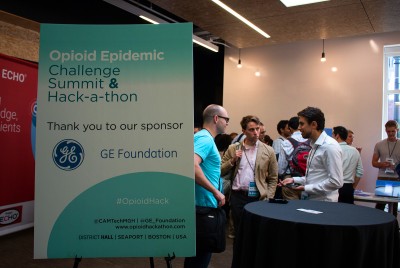
On any given day in the United States, 78 people die from an opioid-related overdose, according to the United States Department of Health and Human Services. This number is only rising, according to the Centers for Disease Control and Prevention, which reported that the rate of overdose deaths involving opioids — mostly prescription painkillers and heroin — has increased by 200 percent since the year 2000.
Physicians and researchers at Massachusetts General Hospital and the GE Foundation have been studying this “opioid epidemic” for years. Friday through Sunday, MGH and the foundation, in partnership with the Consortium for Affordable Medical Technologies, sponsored the Opioid Epidemic Challenge Summit and Hack-a-thon, a two-day hackathon and one-day informational summit at District Hall.
According CAMTech’s website, the summit and hack-a-thon brought together “clinicians, engineers, entrepreneurs, designers, students, and others to innovate for new technologies and solutions that address the prevention, treatment and recovery of opioid addiction.”
“It’s going to take an incredible partnership amongst all of us to turn those ideas into real lives saved in the state of Massachusetts and across the country,” said Katrina Armstrong, chair of the department of medicine and the physician-in-chief at MGH, in her opening remarks Friday.
Friday served as a summit where participants in the hack-a-thon and the general public could learn more about the opioid epidemic and what organizations like MGH and the GE Foundation are doing to prevent it from spreading.
Some featured speakers from the summit were U.S. Chief Technology Officer Megan Smith, Director of National Drug Control Policy Michael Botticelli, former Boston Celtics player and founder of The Herren Project Chris Herren and Massachusetts Gov. Charlie Baker.
Baker discussed steps the state government is taking to combat the opioid crisis.
“The opportunity for really positive change is very real,” Baker said in his speech Friday, “and it will have an impact on audiences far bigger than I think most people here imagine and appreciate.”
One panel, moderated by MGH Medical Director for Substance Use Disorders Sarah Wakeman, outlined the scope of the epidemic.
“We are really trying to help our providers understand that this is a disease, and help our patients get the care the deserve, when and where they need it,” said Colleen LaBelle, a program director at the BU School of Medicine’s Clinical Addiction Research and Education Unit, during the panel.
Also on the panel was Jeffrey Samet, chief of the Section of General Internal Medicine at Boston Medical Center. He said he agrees that beyond educating doctors on how to help addicts find long-term treatment, it is important to build support systems in the patients’ communities.
“It’s not just education. It’s how we build systems to provide care in the medical settings in which we work that I think are the key and the ticket to getting care to patients, be that inpatient setting or the outpatient setting,” Samet said.
Some of the most powerful moments of the summit came from the speeches of individuals who were touched by addiction, such as Joanne Peterson, who has multiple family members who were opioid addicts at one point. Peterson founded Learn to Cope, a support network for families dealing with addiction and recovery.
The nonclinical side of addiction was also discussed. Jonathan Steer, an obstetrician at Boston Medical Center, said he participated in the hack-a-thon because he wanted to hear what people from different backgrounds would come up with to help solve the epidemic.
“[I’m interested in] meeting people across the city who do things similarly, but also just the enjoyment and the fun of meeting people outside of medicine who are interested in similar problems and working towards a common end product,” Steer said.
On Sunday, five awards of $1,000 each were given to hack-a-thon teams: the Innovation Award, the Anti-Stigma Award, the Tech Solution Award, the Treatment On-Demand Award and the Community Building Award. The winning teams came up with innovations such as a notification system that reminds patients to dispose of expired medications, an SMS-based system that increases access to lifesaving resources and information and a mobile van with treatment on demand for those struggling with opioid addiction.
In order to ensure that progress is made coming out of the hack-a-thon, the GE Foundation will award $10,000 to the team that makes the most progress 90 days after the hack-a-thon as well as business acceleration support through the CAMTech Innovation Platform.
Peter Monaghan, an area manager at CleanSlate Addiction Treatment Centers who attended the hackathon, said he is looking forward to seeing technology change the way healthcare providers deal with addiction.
“We can look at ways to approach education, prevention and treatment,” Monaghan said. “If we could have a centralized place, using technology to our advantage, where we could tie it all together, that’s going to be great.”






















































































































